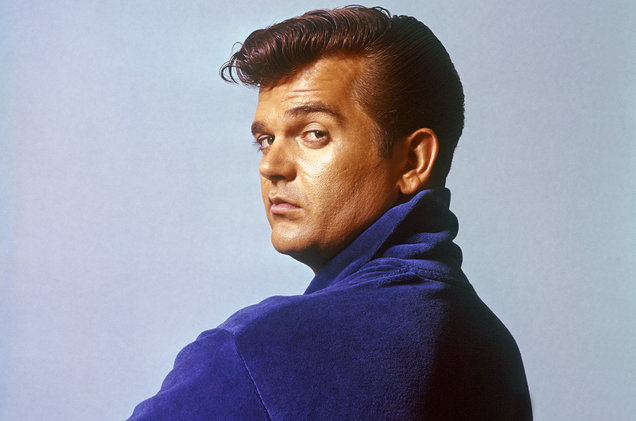Conway Twitty - "The Rose"
So I've loved Conway Twitty for as long as I can remember. His song "Slow Hand" was one of my parents' songs and "Hello Darlin'" is a classic that gets me weak in the knees. His voice was thick, and rich, and in the beginning of his career many people thought he was Elvis Presley using a different name. There was something about the way he attacked a song that made it jolt right into you when you listened. His jovial manner and his easy smile endeared him to his listeners, and his honest songs and powerful voice made him a billboard staple.
He also had success in the rock and roll, rock, R&B, and pop genres. From 1971 to 1976, Twitty received a string of Country Music Association awards for duets with Loretta Lynn. Although never a member of the Grand Ole Opry, he was inducted into the Country Music Hall of Fame and the Rockabilly Hall of Fame.
Twitty always wanted to record country music, and, beginning in 1965, he did just that. Disc jockeys on some country-music radio stations refused to play his first few country albums, because he was known as a rock-and-roll singer. However, he had his first top five country hit, "The Image of Me", in July 1968, followed by his first number one country song, "Next in Line", in November 1968. Few of his singles beginning in 1968 ranked below the top five.
In 1970, Twitty recorded and released his biggest country hit, "Hello Darlin'", which spent four weeks at the top of the country chart and is one of Twitty's most recognized songs. In 1971 he released his first hit duet with Loretta Lynn, "After the Fire Is Gone". It was a success, and many more followed, including "Lead Me On" (1971), "Louisiana Woman, Mississippi Man" (1973), "As Soon As I Hang Up the Phone" (1974), "Feelins'" (1975), "I Still Believe in Waltzes", "I Can't Love You Enough", and many others. Together, Conway and Loretta (as they were known in their act), won four consecutive Country Music Association awards for vocal duo (1972–75) and a host of other duo and duet awards from other organizations throughout the 1970s.
In 1973, Twitty released "You've Never Been This Far Before", which was number 1 in country for three weeks that September and also reached number 22 on the pop charts. Some more conservative disc jockeys refused to play the song, believing that some of the lyrics were too sexually suggestive.
In 1978, Twitty issued the single "The Grandest Lady of Them All" honoring the Grand Ole Opry, but for the first time since 1967, a single of his failed to reach the top ten, as some radio stations refused to play a song honoring the property of a competitor (broadcast by WSM-AM). Nevertheless, the single reached the top 20, peaking at number 16, but it was well below expectations, and this set in motion the changes that were to take place in his career, including a new hairstyle, changing from the slicked-back pompadour style to the curlier style he would keep the rest of his life. However, Twitty's popularity and momentum were unaffected by the song, as his next 23 consecutive singles all made it into the top 10, with 13 peaking at number 1, including "Don't Take It Away", "I May Never Get to Heaven", "Happy Birthday Darlin'" and remakes of major pop hits such as "The Rose" and "Slow Hand".
In 1985, going by all weekly music trade charts, the song "Don't Call Him a Cowboy" became the 50th single of his career to achieve a number-1 ranking. He would have five more through 1990, giving him a total of 55 number 1 hits. George Strait matched the feat of 50 number-1 hits in 2002 with his single "She'll Leave You With a Smile" and then reached number 1 for the 56th time in 2007, when the single "Wrapped" hit the top on the Media Base 24/7 list.
Throughout much of Twitty's country music career his recording home was Decca Records, later renamed MCA. He signed with the label in late 1965 but left in 1981, when it appeared MCA was marketing and promoting newer acts; management at the label had changed, in addition to other factors that brought on the decision. He joined Elektra/Asylum in 1982. That label merged with its parent company, Warner Bros. Records in 1983. He stayed with Warner Bros. through early 1987 but then went back to MCA to finish his career. In 1993, shortly before he died, he recorded a new album, Final Touches.
So today, with a slow hand and a smile, I choose Conway Twitty's version of "The Rose" as my, belief makes things real, patience is a virtue learned over time, Hope is the lighthouse we set our course by, song for a, I walk a little faster, just around the corner, build a little stronger castle in the air, Thursday.
